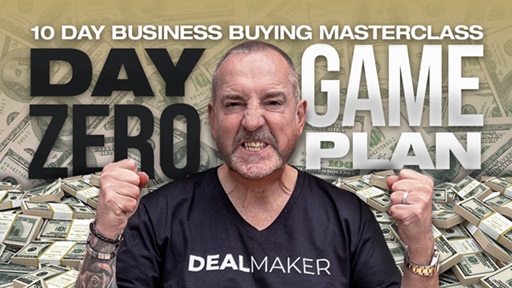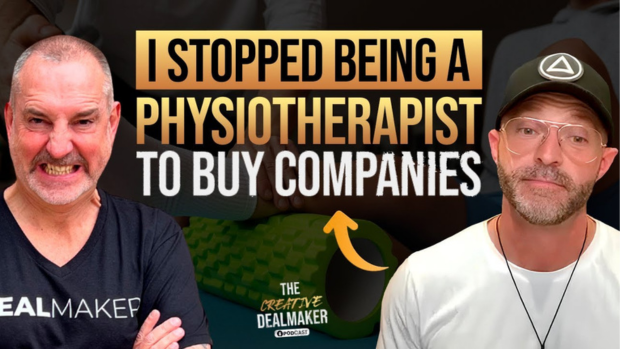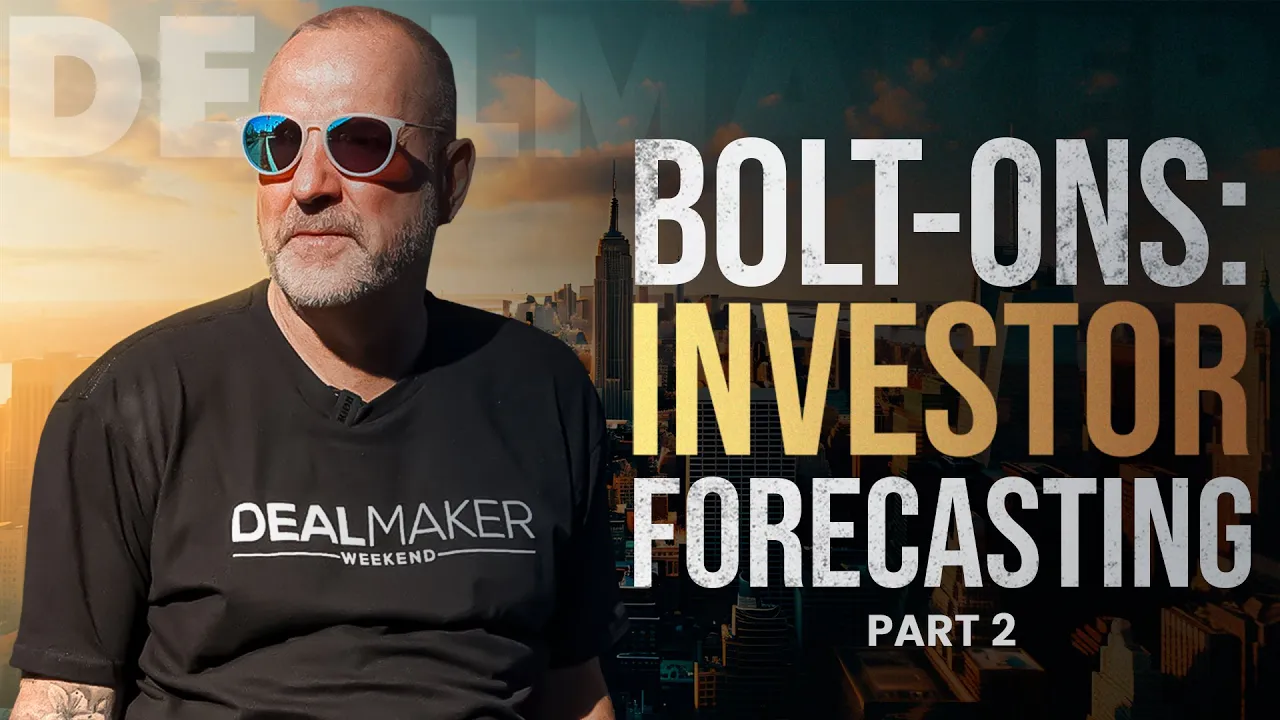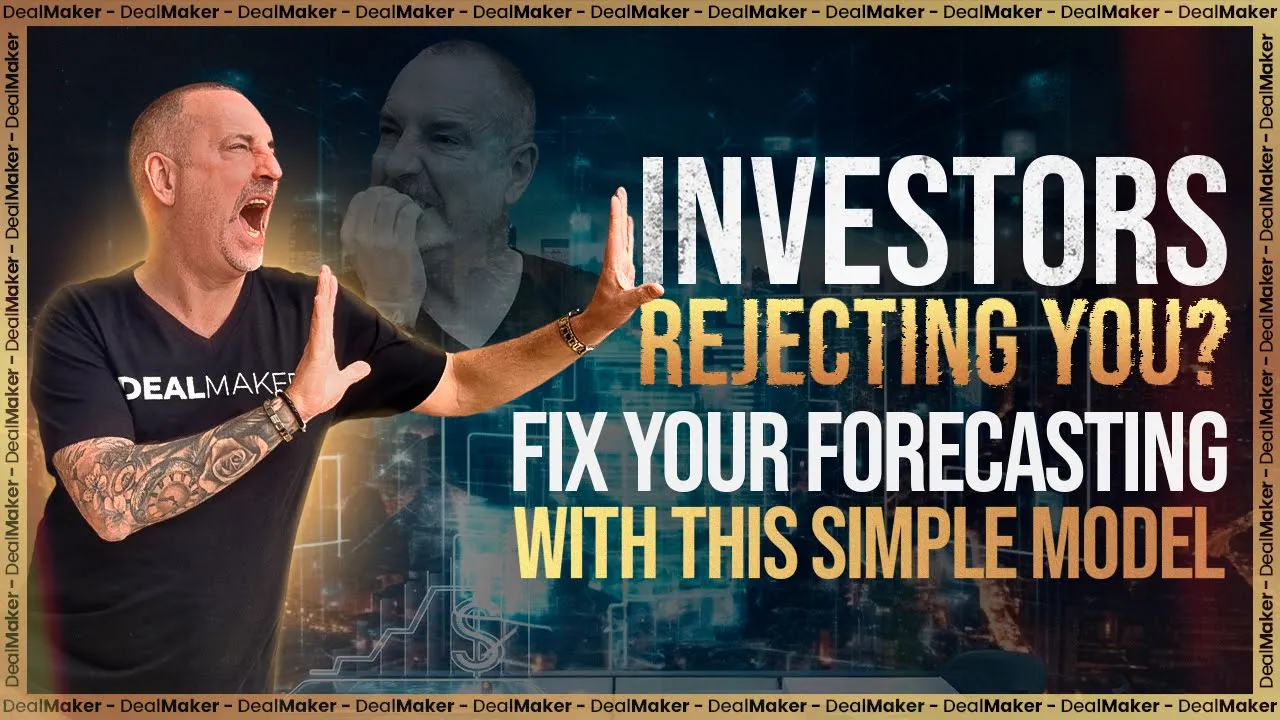Day 4 – Seller Meetings | 10 Days To Buying Your First Business
Day 4 – Seller Meetings | 10 Days To Buying Your First Business
In Day 4 – Seller Meetings from Carl Allen’s series “10 Days To Buying Your First Business,” he focuses on the crucial elements of meeting with sellers for the first time. The episode begins by emphasizing the importance of building rapport, which should start well before the meeting. Carl shares personal stories about how connecting with sellers on a personal level can melt the ice and pave the way for successful negotiations. He stresses spending 20-30 minutes getting to know the seller before diving into business discussions.
Once rapport is established, the next step is vetting the business. Carl outlines five critical questions to ask the seller to understand their motivations and the state of the business. The first and most important question is, “Why are you selling?” Understanding the seller’s psychology can influence how you structure the deal. He encourages buyers to pay attention to non-financial reasons for selling, such as retirement, burnout, or the desire to preserve legacy.
Carl continues by discussing the need to assess the business’s management. A key question is, “Who runs the business?” Buyers should determine whether the owner is deeply involved in daily operations or if the business can run without them. This gives insight into the stability of the business post-acquisition. He also advises asking about the business’s marketing strategy and growth potential, which can highlight opportunities for future improvements and scalability.
The final step in the meeting is securing a non-disclosure agreement (NDA) to access the financial details of the business. Carl explains that if buyers have been dealing with brokers, they may already have some financials, but in direct approaches, the NDA is essential for gaining insights into the company’s numbers. He also introduces the importance of understanding the competition and the unique selling propositions that set the business apart.
Carl wraps up the episode by previewing the next day’s content, which will focus on evaluating a business’s financials and deal structuring. He encourages listeners to continue building strong relationships, vet businesses thoroughly using the five questions, and always secure an NDA to move forward in the buying process.
Full Transcript:
It was my way of building rapport. It was my way of building that relationship, which just completely melted the ice. The guard went down. The guy even hugged Dealmakers, what’s up?
My vision is to completely and utterly disrupt the market for buying and selling small businesses all over the world. Hey, guys. Carl Allen. Welcome to day four of the first ten days to buying your very first business. So today, we’re talking about meetings.
So you’ve dialed in your mindset. You’ve established your buy box. You’ve gone out, and you’ve done some deal origination that we talked about yesterday. But now you’ve got sellers that are ready to meet you about you potentially acquiring their business. So when you go and have a seller meeting for the very first time, there are three goals that you’re looking to achieve. The first one is to continue building rapport.
Really, really important. The second thing that you’re looking to do is to start to vet the business.
And there’s five killer questions that I’m gonna walk you through that you need to be asking the seller. And then the third part is to go under something called an NDA, which is a nondisclosure agreement, so that you can then get the financials for the business. So if you’ve been dealing with business brokers so remember brokers are only one of the four ways that we typically originate deals, you’ve probably signed an NDA with the broker and got the numbers before you actually go to the meeting. But if you do enough market deals, so if you’re doing direct approaches, if it’s a referral from a wealth manager or a CPA or a lawyer or somebody else that you’ve spoken to, or you’ve been leveraging social media like LinkedIn and Facebook and other groups and networks to get deals, then you’ve probably not got any financial information at all about the business, so you still will need to do the NDA.
So the NDA is a third step. So the first part of the meeting, and this is really, really critical, is you’ve got to continue to build rapport. Now hopefully, you’ve already built some rapport with the seller either from the letter that you’ve written or the sponsor in from somebody in your network or the initial conversation that you’ve had with them over the phone. So So as soon as you get to the meeting, you know, you shook hands, if you just sat down, they fixed you a coffee or water, whatever, do not, under any circumstances, dive straight into questions about the business.
You want to be building a relationship. So just get to know them a little bit more. Like, where do they live? Have they got children, grandchildren?
Have they got hobbies? What sports teams are they into? Do they drink wine? Do they drink beer?
Where do they go on vacation? Doesn’t matter. Spend at least twenty minutes, ideally thirty minutes, just getting to know them. And if you’ve done your research on the business, and if you found them on LinkedIn, you found them on Facebook, you’ve you’ve Googled the business, they’ve won awards, and they’ve just hired a new member of staff, or they just won a new client, or they checked in at the Red Sox or or, you know, they’ve just been on vacation to Grand Cayman and checked into a particular bar.
Whatever it is, find out what you can about them, and you know how to do this work. You can hire a VA in the Philippines, seven, eight dollars an hour. They’ll do all of that research for you. And then really kinda get to know them, build a friendship.
Because back in the day when I was a Wall Street m and a guy, it’s all about math and financial engineering. But in our piece of the market, Main Street, not Wall Street, It’s about relationships. It’s people buying and selling businesses from other people. So you really, really wanna get that relationship really kind of solid.
And really quick story about my relationship building is I I was doing some direct deal origination.
I had a conversation with with a Sullivan engineering business. And, in that kind of initial call, this wasn’t face to face. This is an inner conversation. I found out that the seller just had a grandchild.
He came from a a a very kind of football kind of mob city where there’s two teams. There’s a red team, Liverpool, blue team, Everton. This is in the UK. And, his daughter had married, a supporter of the rival team to his.
He was a blue, and Everton fan. His daughter and his daughter had married a guy who’s a Liverpool fan, and he took great pride in dressing the granddaughter up in a red baby soccer kit, not a blue baby soccer kit. And every time the daughter would bring the baby around to the grandparents, she’d be wearing this kind of red kit, and it would, you know, cause him some some concern, some upset, some distress. So he told me about that, and, I called my assistant straight after the call.
I was going to visit him in the business about a week later. I said, hey. Go online and buy me a baby Everton blue soccer kit, which he did. It was, like, twenty bucks.
And then when I went for the meeting, I gave it to him. I said, hey. I felt really bad that, you know, your, your your son-in-law’s doing this thing, and wanted you to have a baby soccer kit. And he probably bought her one himself, but it was the thought.
It was my way of building rapport. It was my way of building that relationship, which just completely melted the ice. The guard went down. The guy even hugged me.
So it was incredible that we kicked the meeting off with with something so powerful. Now I’m not recommending you go out, you buy soccer kits for their grandkids or you do anything like that, but just find a way looking at their background, their LinkedIn, their Facebook, going on Google, find out some stuff about them, and then just talk about it. And talk about it as if you’re interested in it. Find things that relate to you.
So if you’ve been to Grand Cayman on vacation and they have, you can talk about what you did. If you’re a Red Sox fan and you know that they like the Red Sox, you can talk about that. You know, the last game or how are things this season or, you know, what’s going on? Just build a friendship.
Make them like you based on those commonalities. So that’s the first thing. You’ve got to continue rapport. You’ve got to build the relationship.
Now, number two, what you’ve then got to do is you’ve got to start the business. So if you’ve had some financial information, if it’s a broker deal, you can go through the numbers and review those. But there’s five killer questions that you wanna be asking the business owner.
The question number one, really, really important.
Why are you selling?
Before you go anywhere else, ask the question, why are you selling the business? Right? Really, really important. Because if we can understand the seller’s psychology, then that will help us in the deal structuring and the negotiation.
So typically, business owners, they might wanna retire. They might be sick. They might be dying in some cases, not just them. Could be a family member.
They might be burned out, frustrated, run out of ideas. They might be bored. It doesn’t matter. Really try and understand the seller psychology by asking them why are they selling.
Look at their body language. If they go, oh, I’m sick of this business. You know, I’ve been in this business for twenty five years, and, you know, I’m I’m just it’s my time. You know, I’m done.
If somebody says that, then you know you can probably negotiate a deal that that’s very, very creative. Right? You can leverage their sales psychology. If they’re trying to say, well, you know what?
We’ve smashed this business the last three years. We’re we’re at all time highs, revenue, profit. You know, I wanna sell it for the maximum amount of money. Whoever’s crazy enough to cut me a five hundred million dollar check, I’m gonna do the deal.
Right? Well, clearly, that’s not the right type of seller, and you’re probably not gonna go and do that deal. Bear in mind, eighty percent of business owners sell their businesses for nonfinancial reasons. They’re talking about preserving legacy, protecting employees, all of those amazing things.
So asking why they’re selling the business and really kind of drilling into that is really, really important. Number two, who runs the business?
So what you’re trying to ascertain here is, is the owner dependent inside of the business? Is the business owner dependent? So one of the questions I sometimes ask is, hey. If you were to go on a four week vacation, you have no cell phone, no Internet, and you were marooned on a desert island for four weeks, what would happen to your business in that mean in, you know, in that interim period?
If they said, oh, wow. Well, you know what? I come back. The whole place would be in chaos.
You know, revenues would be down, all my customers would be fleeing, then, you know, that’s a problem business for you to buy because the seller is very, very kind of critical to a lot of the day to day operations. They say, well, hey. You know, if I went out on my vacation, I didn’t check-in. You know, I’ve got Jeff.
Jeff’s my number two. He runs the day to day. I work more on the business, not in the business. You know, Jeff will kinda get things handled.
He can make the right decisions.
That’s fantastic. That’s a great business for you to buy because you can take the owner out, replace yourself as the owner investor, and then Jeff can continue as your GM running that business for you and continuing to do the day to day activity. So understanding who runs the business is really, really important. Question number three, what’s your marketing strategy?
So what will blow your mind as you go and talk to sellers is how little marketing most small businesses do, whether in the UK, Australia, US, Canada, doesn’t matter. Most small businesses don’t do any marketing. It’s all repeat business, and it’s all word-of-mouth referrals. So don’t be surprised four times out of five, a seller says to you, well, Karl or Jeff or Pete, that’s what’s great about our business.
We don’t do any marketing. It’s all repeat customers coming back year on year, and then they go and they tell their friends, and we get these word-of-mouth referrals. Those are fantastic deals to do because you know you’ve got a rock solid core of customers every single year. And then when you start to put some marketing and some growth into that business, and we’ll get into that on day number ten, you’re growing the business over and above a very rock solid base of revenue and profit.
So understanding what’s the marketing strategy. And if they’ve got one, you know, talk about it. You know, if they’re marketing online, you know, what’s their cost per customer acquisition? What’s their marketing budget?
Are they using Facebook ads? Are they using Google, SEO? You know, what whatever they’re doing. Are they advertising in the newspaper, on the radio, trade shows?
Doesn’t matter what it is. You know, find out what’s their marketing strategy. Because remember, when we talked about your buy box, we talked about your value add. What can you add to the business in terms of a value driver?
You might have a network. You might have some marketing skills which are complementary to the business that you’ve already got. So that’s question number three. Question number four.
This is a really cool question. Question number four is I ask them, if they not if they weren’t selling, what would they do to grow?
This is really, really important. Right? So you’re looking to get all of that low hanging fruit because a lot of the reasons people sell is they see a lot of growth opportunities, and they just don’t wanna go through that pain and suffering. A lot of business owners are happy, kind of ticking over year on year with the same financial performance and generating the income that they need to live the life that they’ve got.
They see all this opportunity out there, and they don’t wanna pursue it because they’re old and tired and frustrated and distressed, and they just don’t wanna do it. But you wanna understand what that is. You wanna tap into that because that might drive you to a higher multiple on the valuation and might look at you structuring the deal in a certain way. So you always wanna ask what are the growth opportunities that the seller would capitalize on if they were not selling the business?
And then question number five, I want to know about the competition.
So I ask a question like, who do you compete with the most in the marketplace, and how do you beat them? Right. And then I’m also gonna ask when they beat you, how do they beat you to win the customer? So what I’m trying to understand here is something called the USP.
What’s the unique selling proposition? And sometimes, you visualize a business owner will say to you, well, I actually don’t know how we beat our customers in the market. I actually don’t know how we beat our competitors and get those customers. You know, I don’t know what I don’t know.
So I said, well, hey. If you were to call your top five customers and say, hey. Why did you do business with us versus competition?
What would they say? What are the unique characteristics about the business that make them do business with you? Because every business is unique in some way. I talk about something called the three uniques.
Like, in any business I buy or I own, I look at what are the three things that we do that are different to the rest the market. Some of the competition might do one of those things. A couple of them might do two of those things. It’s very, very rare that if you’ve got three specific uniques about your business, that anybody else in the market has those same uniques because the world’s all about differentiation.
There’s only three ways you can differentiate as a business. You can differentiate on price, which I would never recommend you do. It’s either Amazon or China will kill you in the end. Number two, we could differentiate on quality.
So do you have a higher quality of product or service than the rest of the competition? And number three, you can differentiate on service. So are you taking care of your customer much better, much more efficiently? You’re wiring them more than anybody else.
If you can compete on quality and service, you will have an absolutely phenomenal business. So those are the five killer questions that I’m asking sellers. And then the final point is once you’ve gone through building rapport, so you’ve built a relationship, you’ve gone through vetting the business through those five questions, that’s gonna give you credibility, that’s gonna give you trust, it’s gonna give you intelligence and real chops in that sector in the eyes of the seller, then the seller’s thinking, wow. This is a great person.
Probably could be a great safe pair of hands. He knows what he’s talking about or what she’s talking about. Then you sign something called a nondisclosure agreement and an NDA, and then the seller will give you all the financials inside of the business. And that is what we’re gonna be talking about tomorrow on day number five.
I’ll be walking you through what are the types of financial information and other data that you need to do, like, a desktop evaluation of the business, how to calculate its value, how to look at a deal structure, how to understand where the financing is gonna come from, all those different things. Then day number six, I’ll show you how to value and structure a business and look at the fundability of a deal. So I hope you found that useful. Just to summarize your meetings, number one, go and absolutely build world class rapport, phenomenal relationship.
Number two, vet the business using those five colored questions. And then number three, sign an NDA to get the financials, and then that will serve you for tomorrow. So I hope you found that useful, and I will see you guys soon. Until then, bye for now.
Hey, guys. I’m Carl Allen. I’m the founder of DealMaker World Society. I’ve done tens of billions of dollars of deals over the last thirty plus years.
If you’re new to my channel, definitely hit like and subscribe so that you can get all of my amazing DealMaker content in real time. You’re not gonna miss any of the outstanding information that I’m gonna share with you. And if there’s a question that you’ve got, if there’s something that you want to know the answer for, you want me to speak to it, definitely hit me up in the comment section, and I will record those videos for you. And I will get them on this channel as soon as possible.
So love having you part of this YouTube community, and I can’t wait to serve you. Until then, bye bye for now.

The 10 Days to Your First Business Acquisition Podcast Channel
11 Episodes



